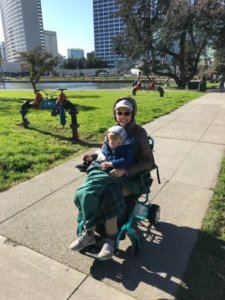My husband often pushes me home in my son’s stroller because I have enough energy to get to the playground but not enough to get home. There are so many types of disabilities and so many ways to address them, and the disability rights’ activists of the 70s taught the world – and myself – that “disability” is normal but that restricting our lives is not. When my husband is grunting and sweating, pushing me up the hill in the stroller with my son on my lap, passersby always smile and laugh and say, “That’s the way to do it!” We smile and nod, too, because my husband and I enjoy walking to the park even if this is the only way for us to do it.
My disability is largely invisible and somewhat fluid due a disease called myalgic encephalomyelitis (ME) – also known as chronic fatigue syndrome. I’m still experimenting with using a wheelchair so that my son and I can travel farther without the aide of my husband. I rented an electric one for a month. It was thrilling being able to leave the house without having to get into the car and not having to worry if I’d crash myself trying to get us home. We’d pull up in the wheelchair, and then I’d promptly stand up out of it to help my son down the slide or climb on the monkey bars and, when it was time to go home, we’d get back in the wheelchair and zoom home, and I’d still have enough energy to cook dinner. I was shy at first about the quizzical stares, but I knew I didn’t have to justify my body to anyone. I was doing what everyone else does all day long: making it work.
Unfortunately, the wheelchair didn’t work out because Oakland sidewalks are notoriously bumpy, and it was too difficult to sit my toddler son on my lap for that length of time. Each time, I’d return home with a headache and dead legs. (My next plan is to try out a wheelchair with better shock absorption when my son is old enough to walk to the park alongside me.) But, for someone with ME, a wheelchair is only one piece of the 1,000-piece puzzle. There are many times my body isn’t strong enough to head to the playground at all. With ME, I’m constantly rationing out my energy and often there isn’t enough for the playground, which a wheelchair can’t fix.
The disability rights’ activists who fought for the ADA act not only gave me the opportunity to accommodate my physical disability, it freed me to acknowledge and respect my body’s needs in the first place. I feel no shame getting pushed in my son’s stroller (although I do feel gratitude for my strong and willing husband). I was shy at first about using the wheelchair since people largely know me to be ambulatory, and I knew it would generate stares and questions and confusion. But, I feel no need to explain or justify my disabilities that are sometimes invisible and sometimes in plain sight – and I owe that to the disability rights’ activists who came before me.




 ) and a message about #MillionsMissing with your own networks. Desktop: Download by right clicking on the image or clicking on the download icon in the bottom right corner of the image. Mobile:
) and a message about #MillionsMissing with your own networks. Desktop: Download by right clicking on the image or clicking on the download icon in the bottom right corner of the image. Mobile:
